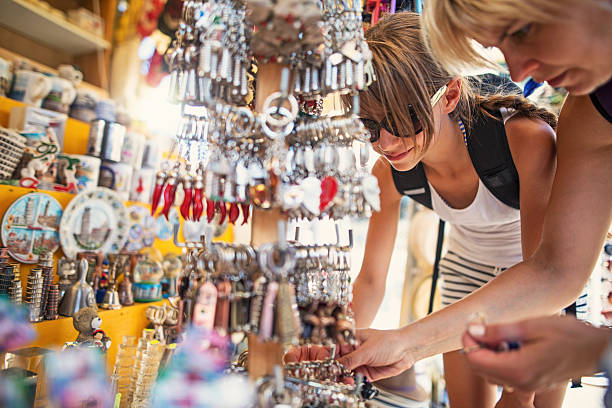When traveling abroad, souvenirs are often seen as a way to bring a piece of the place you’ve visited back home, a tangible memory of an unforgettable experience. However, as tourists, we must also be mindful of the impact our purchases have on local communities, the environment, and the global market. The concept of ethical tourism is gaining momentum, and sustainable souvenir shopping is a key part of this movement. This guide will help you make responsible choices when buying souvenirs abroad—so you can preserve memories without leaving a negative impact.
Why Sustainable Souvenir Shopping Matters
Many souvenirs, especially mass-produced items, are not only bad for the environment but also exploitative of the workers who make them. Cheap trinkets or products made from endangered species, toxic materials, or unsustainable resources contribute to environmental degradation. Additionally, poorly paid labor in exploitative conditions is often hidden behind the shiny exterior of some souvenirs.
Sustainable shopping ensures that your purchases support ethical labor practices, respect cultural traditions, and protect the environment. By buying responsibly, you’re helping local artisans maintain their craft, promoting fair wages, and preserving natural resources for future generations.
1. Look for Locally Made Products
One of the easiest ways to support local communities and minimize your environmental footprint is to purchase locally made items. Local artisans often use traditional methods, which not only preserves cultural heritage but also reduces the carbon footprint of transporting mass-produced goods. You’ll also know that your purchase supports the livelihood of the craftspeople who make the products.
Look for markets, cooperative shops, and artisan boutiques that highlight local craftsmanship. Whether it’s handwoven textiles, pottery, or locally made jewelry, these products are unique to the place you’re visiting, giving you a special connection to the area.
2. Choose Fair-Trade and Certified Products
Fair trade is an important principle for sustainable shopping, as it ensures that artisans are paid fairly for their work and that the products are made under ethical working conditions. Fair trade certifications, like the Fair Trade International and World Fair Organization labels, guarantee that a product has been made in a way that protects workers’ rights and the environment.
Look for the fair trade logo or inquire about certifications at shops you visit. By choosing fair-trade products, you are contributing to a more equitable global market that values human dignity and sustainable practices.
3. Avoid Products That Exploit Wildlife
Sadly, some souvenirs exploit wildlife and contribute to the decline of endangered species. Items made from ivory, coral, turtle shells, or exotic animal skins may be sold to tourists unaware of the environmental harm they cause. These souvenirs not only contribute to the illegal wildlife trade but also endanger species and disrupt delicate ecosystems.
Before purchasing animal-related products, make sure to research if they are sourced sustainably. A good rule of thumb is to avoid anything that seems exotic or rare, especially if it’s not clear where or how the materials were obtained.
4. Consider Eco-Friendly Products
Eco-friendly products made from natural or recycled materials are a great choice for sustainable souvenir shopping. From reusable shopping bags made of organic cotton to eco-conscious jewelry made from recycled metals or reclaimed materials, there are many ways to take home a product that has minimal environmental impact.
When in doubt, ask the seller about the product’s origin and materials. Is it made from sustainable resources? Is it biodegradable or recyclable? Sustainable souvenirs are often more durable than mass-produced options, making them a better long-term investment.
5. Support Small Businesses and Artisan Cooperatives
When shopping for souvenirs, seek out small, family-run businesses or artisan cooperatives. These businesses often prioritize quality over quantity, using traditional techniques and ethical materials. By supporting them, you’re helping to ensure that local artisans can continue to practice their crafts without being overshadowed by large corporations.
Look for shops that are run by local families or co-ops that support the community. These businesses typically offer more authentic, one-of-a-kind products and are more likely to source their materials in a sustainable way.
6. Do Your Research
Before purchasing souvenirs, take a little time to research the items you are considering. Ask yourself questions like:
- Where was this item made, and who made it?
- What materials is it made from, and are those materials sustainably sourced?
- Is the product certified fair-trade or eco-friendly?
- Is it made in a way that contributes to the local community or does it exploit workers?
This research can help you make informed decisions about what you buy and how it fits into the larger picture of responsible consumption.
7. Avoid Mass-Produced, Plastic-Laden Goods
Mass-produced souvenirs often lack individuality and can be harmful to the environment. Items made from plastic or synthetic materials have a significant environmental footprint. They take centuries to degrade in landfills, contributing to pollution and harming wildlife.
When possible, choose souvenirs that are biodegradable, reusable, or recyclable. Products made from wood, stone, or plant-based materials are often better alternatives to plastic trinkets and offer a more authentic experience of the culture you’re visiting.
8. Support Cultural Preservation
In some regions, the sale of cultural crafts helps preserve important traditions and skills that have been passed down through generations. However, it’s crucial to ensure that these crafts are not being exploited or commercialized in ways that harm the local community or culture.
If you’re interested in buying cultural artifacts or handicrafts, be sure to choose those that are truly reflective of the local culture and tradition. Engage with the artisans and learn about the significance of their work, so you can be sure you’re making an informed purchase.
9. Be Wary of ‘Bargains’
If an item seems too good to be true in terms of price, it might be. Cheap, mass-produced goods often come with a hidden cost, either in terms of environmental damage or exploitation of workers. While it’s tempting to get a great deal, consider the true cost of a product: Is it harming the planet or the people who made it? Opt for quality over quantity and be willing to pay a fair price for ethically made goods.
10. Give Experiences Instead of Souvenirs
Sometimes the most memorable gifts don’t need to be physical objects. Consider giving experiences, such as guided tours with local guides, cooking classes, or tickets to cultural performances. These experiences can provide long-lasting memories for both you and the recipient, and often, a portion of the funds goes directly back into supporting local communities.
Mindful Souvenir Shopping for a Better World
As travelers, we have the power to make a positive impact on the places we visit through the choices we make—especially when it comes to souvenir shopping. By opting for locally made, fair-trade, and sustainable products, we support artisans, promote ethical labor practices, and contribute to the preservation of the environment. So the next time you’re on your travels, take a moment to choose gifts that will not only remind you of your trip but also leave a lasting, positive impact on the world. Happy ethical shopping!





